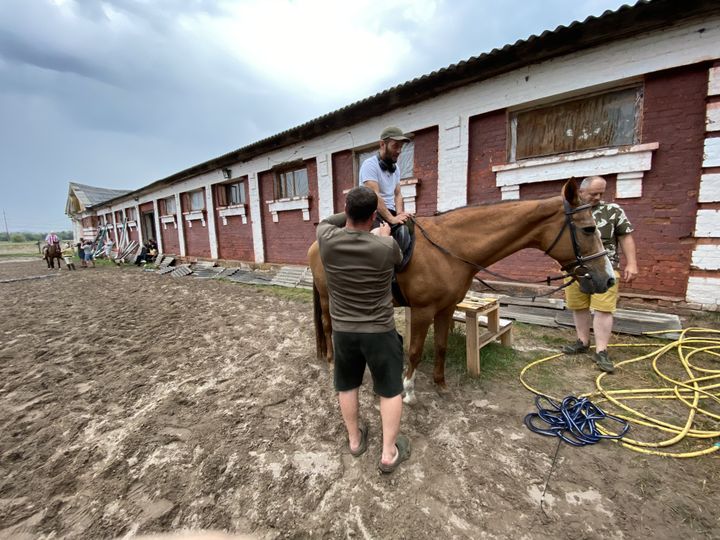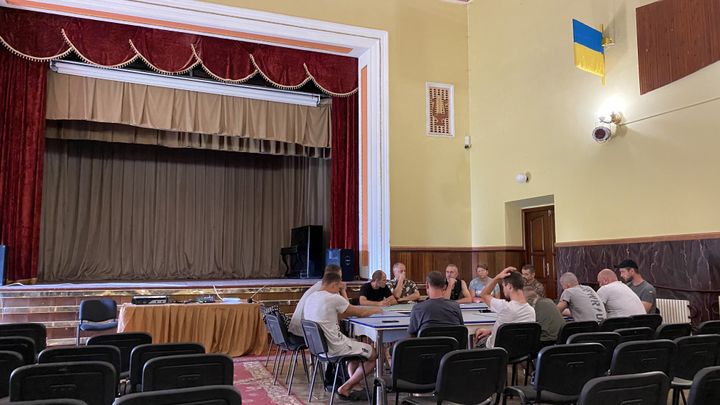Ukrainian fighters remain on the front lines for months, without being able to rest. The hardest hit are sent to a center in the rear, where they receive psychological help. A short break of two weeks, before returning to combat.
Valentin rubs his belly. He has “slept well” tonight, and “it feels good”. He also ate hot, and “that too, it changes the front”. Tap shoes and black tank top on the back, the soldier takes the air on a bench. Far from the din of mortars, he and a hundred Ukrainian fighters arrived at the end of August in this psychological rehabilitation center, one of the few in Ukraine. Hidden somewhere in the Kharkiv region, the big city in the northeast of the country, its location must remain secret, because the Russian army is never far away. Opened in June 2022, this place, which franceinfo was able to visit, has the mission of healing invisible wounds. It has, to date, hosted more than 4,000 combatants.
A few days ago, Valentin was fighting near Klichchiivka, near Bakhmout. For months, the 50-year-old lived “shoulder to shoulder” with his son, in the same platoon. Washed out by life in the trenches, he was exhausted. His state of health, which was deteriorating, went up to his superiors. “My commander told me that I was going to have a little rest. He considered that I really needed it.”
But “to tell the truthconfides this man with a lost look, it’s all my comrades who need a break”. Over there, further east, the artillery strikes are also pounding morale. With trembling hands, the soldier repeats: “The constant bombings…The constant bombings. Stress…Death…Guys dying or getting injured. You talk to someone in the morning, and in the evening, he’s gone.”
“At first I was scared, but it’s over. There, even the fear disappeared.”
Valentin, Ukrainian fighterat franceinfo
Inside the building, a discussion group will begin. As they sit around the table, two men recognize each other: they crossed their foreheads a short time ago. The facilitator asks everyone to talk about their “experience of war”. The faces are serious, the looks haggard. “These soldiers arrive in a deep state of depression. They are tense, on the alertlists Ihor Prykhodko, head of the team of psychologists and member of theNational Guard Military Academy of Ukraine. Some have difficulty expressing themselves with their peers or their family, others also have suicidal thoughts. Memory and vision problems are also common. Is it a reflex? A soldier pulls out his satchel like a weapon slung over his shoulder. A door slam and another jumps up.

To break weariness and weariness, family visits are allowed. The occasion of too rare reunions. “As time went by, he became more withdrawn, notes Lioudmila, Valentin’s wife. There he is in a peaceful place, in another environment.” For loved ones too, the situation is difficult: “It’s a feeling of constant alert. It’s spending your time watching for an appearance on social networks.” With distance, tensions can appear.
“Reload” soldiers, but not “repair” them
A room with obsolete frescoes houses the physical activities. In a sky blue blouse, Oleh B., physiotherapist, sets up the equipment for his gymnastics class. “Guys often come to see me with back problems, especially in the lower back, with herniated discs.” The weight of bulletproof vests and ammunition, he explains, smashes the spine, a little more every day. “We try to give them exercises to do in their spare time, or on the front line.”
Aromatherapy, salt infusions, role-playing, laser… All means are good to revive the spirits, including the company of horses. Ivan, dressed all in black, is perched on his white mount. “Since my arrival in the center, I start to smile every day. VSIt didn’t happen very often these days.”
“The hardest thing on the front is to close in on yourself. Here, we even sometimes talk about something other than the war.”
Ivan, Ukrainian soldierat franceinfo
A little further, Dmytro sees horses for the first time in his life. A cap on his head, he wanders around the stable, without quite being there. “Hard to explain how I feel. I was morally killed.” Mobilized at the start of the war, he has only been entitled to ten days of rest since. “How is it there? Sorry, but I can’t describe it to you. I’m exhausted, in mind and in body.”

The residents stay there for two weeks. In such a short time, it is difficult to perform miracles. Just enough time to put a plaster on buried wounds. “They all arrive in ‘low battery’ modedetails Ihor Prykhodko. Our goal is to recharge them, not repair them.” Over the months, however, “fatigue is setting in, and a form of demotivation is showing up”, observes the doctor of psychology, with the risk of increasing the sequelae. Especially with almost no permission or rotation.
“It’s almost impossible to stay psychologically fit for so long, in such a difficult war.”
Ihor Prykhodko, Doctor of Psychologyat franceinfo
In 95% of cases, says the specialist, this short break still improves the physical and psychological condition of the soldiers. Because the goal is to send them back to the battlefield, where they will continue”to fulfill their duty” and serve the country.
At the end of the fifteen days, a medical commission must evaluate the files of Valentin and the others. Are they fit or not to take up arms again? Ihor Prykhodko promises that the decision, whatever it is, will be respected by the army. “At the beginning, the general staff did not always listen to us. But now they have understood that it was in their interest”. He refuses to say more, but the fear of suicides on the front is present in people’s minds.

The soldiers have no say. “If one of them does not want to go back? The decision is up to the commander”, Ihor Prykhodko cup. Escape from here? “But how? There are barriers everywhere. And anyway, every soldier knows the risk involved.” The most serious cases, such as soldiers suffering from post-traumatic stress disorder, go before a commission of psychiatrists, who can decide to send them to a specialized establishment.
“It happens that it cracks” also among caregivers
Troop turnover is rapid, and as the Ukrainian counter-offensive stalls on the southern front and fighting intensifies in the east of the country, rotations could accelerate further. “It’s always difficult to see them leave”, slips Lioudmila, one of the psychologists. “We stay in touch and they can reach us whenever they want, if they need to. I sometimes send them a few words of support, when I see passing messages on fights in progress.
Sometimes the news is bad. A few weeks ago, medics read in the newspaper that a former patient had just died in combat. Within the medical team, “it happens that it cracks”, confesses Ihor Prykhodko. “We talk to each other a lot, we help each other, we debrief, but it’s hard”. He himself has friends who are fighting on the front line at the moment. Recently, one of them texted him some news. “He told me it was starting to be hard. I tried to help him a little.” Lioudmila also knows something about it: her husband, an officer, is fighting somewhere on the line.
Dmytro himself has no illusions for the future. Even if he no longer has the strength, the soldier will, like the others, be sent back to the front around mid-September. “You know, I don’t think these two weeks are going to help me. It’s too late: I’ve already spent too much time there.”

